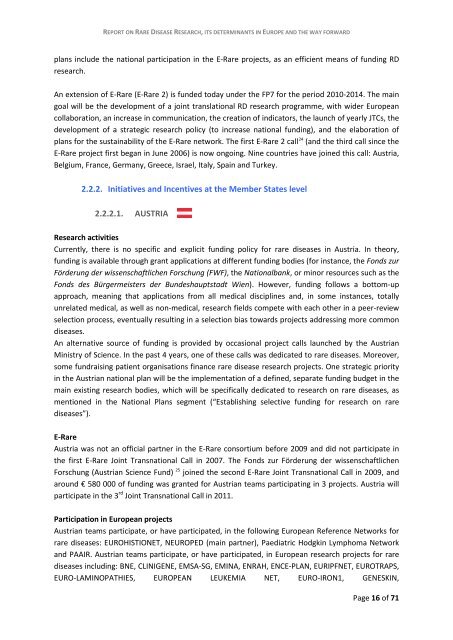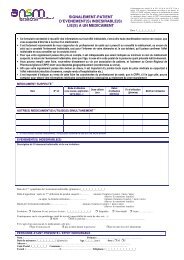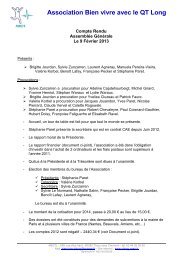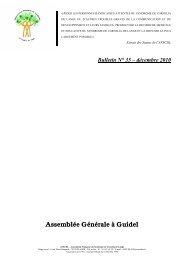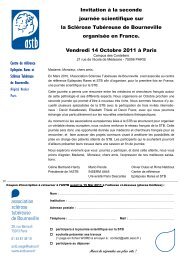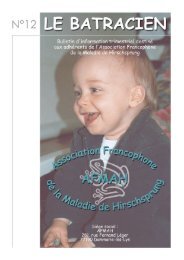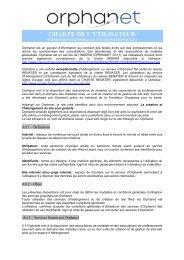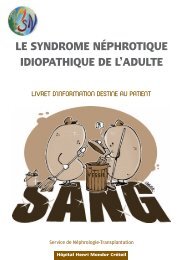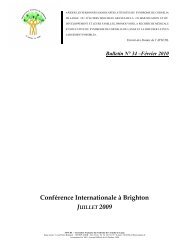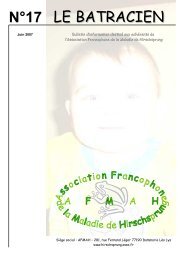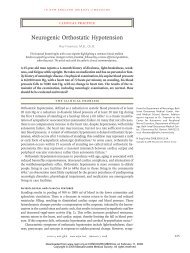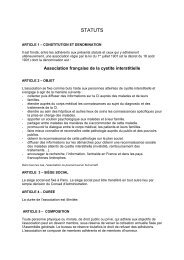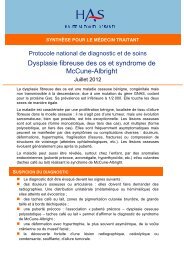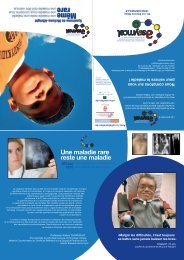report on rare disease research, its determinants in ... - Orphanet
report on rare disease research, its determinants in ... - Orphanet
report on rare disease research, its determinants in ... - Orphanet
You also want an ePaper? Increase the reach of your titles
YUMPU automatically turns print PDFs into web optimized ePapers that Google loves.
REPORT ON RARE DISEASE RESEARCH, ITS DETERMINANTS IN EUROPE AND THE WAY FORWARD<br />
plans <strong>in</strong>clude the nati<strong>on</strong>al participati<strong>on</strong> <strong>in</strong> the E-Rare projects, as an efficient means of fund<strong>in</strong>g RD<br />
<strong>research</strong>.<br />
An extensi<strong>on</strong> of E-Rare (E-Rare 2) is funded today under the FP7 for the period 2010-2014. The ma<strong>in</strong><br />
goal will be the development of a jo<strong>in</strong>t translati<strong>on</strong>al RD <strong>research</strong> programme, with wider European<br />
collaborati<strong>on</strong>, an <strong>in</strong>crease <strong>in</strong> communicati<strong>on</strong>, the creati<strong>on</strong> of <strong>in</strong>dicators, the launch of yearly JTCs, the<br />
development of a strategic <strong>research</strong> policy (to <strong>in</strong>crease nati<strong>on</strong>al fund<strong>in</strong>g), and the elaborati<strong>on</strong> of<br />
plans for the susta<strong>in</strong>ability of the E-Rare network. The first E-Rare 2 call 24<br />
(and the third call s<strong>in</strong>ce the<br />
E-Rare project first began <strong>in</strong> June 2006) is now <strong>on</strong>go<strong>in</strong>g. N<strong>in</strong>e countries have jo<strong>in</strong>ed this call: Austria,<br />
Belgium, France, Germany, Greece, Israel, Italy, Spa<strong>in</strong> and Turkey.<br />
2.2.2. Initiatives and Incentives at the Member States level<br />
2.2.2.1. AUSTRIA<br />
Research activities<br />
Currently, there is no specific and explicit fund<strong>in</strong>g policy for <strong>rare</strong> <strong>disease</strong>s <strong>in</strong> Austria. In theory,<br />
fund<strong>in</strong>g is available through grant applicati<strong>on</strong>s at different fund<strong>in</strong>g bodies (for <strong>in</strong>stance, the F<strong>on</strong>ds zur<br />
Förderung der wissenschaftlichen Forschung (FWF), the Nati<strong>on</strong>albank, or m<strong>in</strong>or resources such as the<br />
F<strong>on</strong>ds des Bürgermeisters der Bundeshauptstadt Wien). However, fund<strong>in</strong>g follows a bottom-up<br />
approach, mean<strong>in</strong>g that applicati<strong>on</strong>s from all medical discipl<strong>in</strong>es and, <strong>in</strong> some <strong>in</strong>stances, totally<br />
unrelated medical, as well as n<strong>on</strong>-medical, <strong>research</strong> fields compete with each other <strong>in</strong> a peer-review<br />
selecti<strong>on</strong> process, eventually result<strong>in</strong>g <strong>in</strong> a selecti<strong>on</strong> bias towards projects address<strong>in</strong>g more comm<strong>on</strong><br />
<strong>disease</strong>s.<br />
An alternative source of fund<strong>in</strong>g is provided by occasi<strong>on</strong>al project calls launched by the Austrian<br />
M<strong>in</strong>istry of Science. In the past 4 years, <strong>on</strong>e of these calls was dedicated to <strong>rare</strong> <strong>disease</strong>s. Moreover,<br />
some fundrais<strong>in</strong>g patient organisati<strong>on</strong>s f<strong>in</strong>ance <strong>rare</strong> <strong>disease</strong> <strong>research</strong> projects. One strategic priority<br />
<strong>in</strong> the Austrian nati<strong>on</strong>al plan will be the implementati<strong>on</strong> of a def<strong>in</strong>ed, separate fund<strong>in</strong>g budget <strong>in</strong> the<br />
ma<strong>in</strong> exist<strong>in</strong>g <strong>research</strong> bodies, which will be specifically dedicated to <strong>research</strong> <strong>on</strong> <strong>rare</strong> <strong>disease</strong>s, as<br />
menti<strong>on</strong>ed <strong>in</strong> the Nati<strong>on</strong>al Plans segment (“Establish<strong>in</strong>g selective fund<strong>in</strong>g for <strong>research</strong> <strong>on</strong> <strong>rare</strong><br />
<strong>disease</strong>s”).<br />
E-Rare<br />
Austria was not an official partner <strong>in</strong> the E-Rare c<strong>on</strong>sortium before 2009 and did not participate <strong>in</strong><br />
the first E-Rare Jo<strong>in</strong>t Transnati<strong>on</strong>al Call <strong>in</strong> 2007. The F<strong>on</strong>ds zur Förderung der wissenschaftlichen<br />
Forschung (Austrian Science Fund) 25<br />
jo<strong>in</strong>ed the sec<strong>on</strong>d E-Rare Jo<strong>in</strong>t Transnati<strong>on</strong>al Call <strong>in</strong> 2009, and<br />
around € 580 000 of fund<strong>in</strong>g was granted for Austrian teams participat<strong>in</strong>g <strong>in</strong> 3 projects. Austria will<br />
participate <strong>in</strong> the 3 rd Jo<strong>in</strong>t Transnati<strong>on</strong>al Call <strong>in</strong> 2011.<br />
Participati<strong>on</strong> <strong>in</strong> European projects<br />
Austrian teams participate, or have participated, <strong>in</strong> the follow<strong>in</strong>g European Reference Networks for<br />
<strong>rare</strong> <strong>disease</strong>s: EUROHISTIONET, NEUROPED (ma<strong>in</strong> partner), Paediatric Hodgk<strong>in</strong> Lymphoma Network<br />
and PAAIR. Austrian teams participate, or have participated, <strong>in</strong> European <strong>research</strong> projects for <strong>rare</strong><br />
<strong>disease</strong>s <strong>in</strong>clud<strong>in</strong>g: BNE, CLINIGENE, EMSA-SG, EMINA, ENRAH, ENCE-PLAN, EURIPFNET, EUROTRAPS,<br />
EURO-LAMINOPATHIES, EUROPEAN LEUKEMIA NET, EURO-IRON1, GENESKIN,<br />
Page 16 of 71


